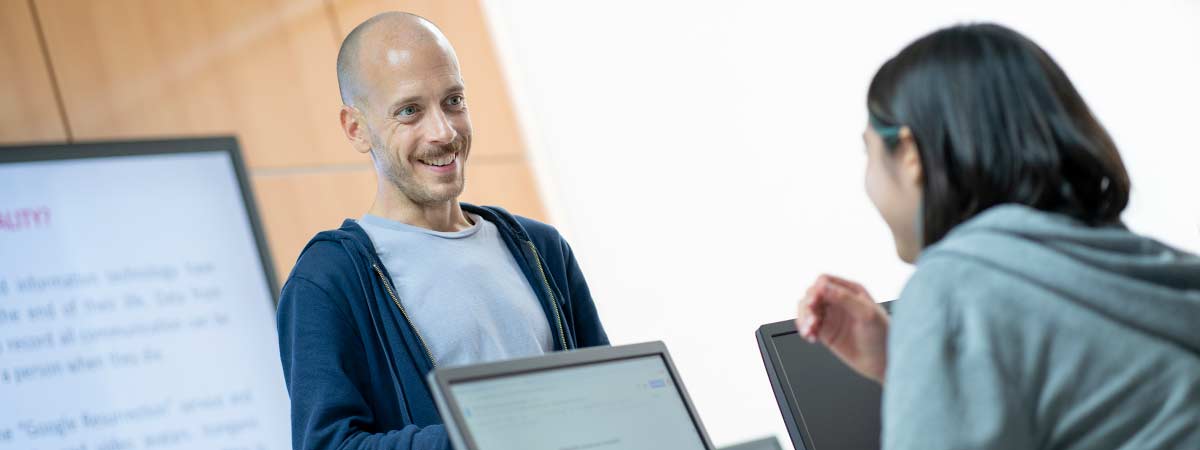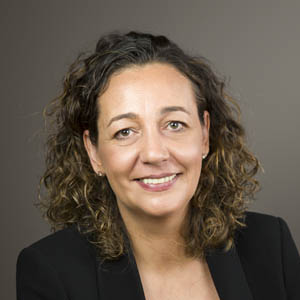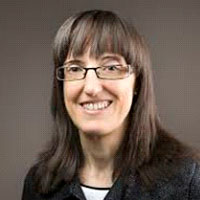Master's Degree in Educational Quality and Innovation

Agreement with the Créate Foundation for professional internships in innovative projects
The EU 2020 Strategy, adopted by the European Council, states that one of the main objectives regarding education is to achieve early school leaving rates below 10%. One of the most important keys to face this reduction in school failure lies in the quality and, more specifically, in the quality of the teaching staff, which becomes the most effective measure to improve student performance.
In this context, the Master's Degree in Educational Quality and Innovation appears as a training specialization aimed at improving educational quality and innovation, an inseparable set, for the reduction of dropping out of the educational system and the increase in the rates of graduate students in Spain.
The purpose of this master's degree is advanced training, both theoretical and applied, in the design and implementation of plans and programs for both Educational Quality and Innovation in educational centers, all oriented towards an impact of improvement in the teaching-learning process.
As a culmination of the year in which the 5th Centenary of the death of Antonio de Nebrija is commemorated, an exhibition was organized at the National Library of Spain to show the intellectual profile of the first Spanish humanist, without ignoring the man, researcher and professor through his enormous work.
Student profile: : University graduate or equivalent (bachelor's or associate's degrees) in Teaching, Pedagogy, Psychology (with a specialization or specialty in education) or Psychopedagogy. Likewise, given the transversal nature of the program, students who have completed the Master's Degree in Teacher Training for Compulsory Secondary Education and Baccalaureate, Vocational Training and Language Teaching, or who have a Teaching Aptitude Certificate (CAP), as well as other Graduates who are Teaching professionals or work as Professors in Educational Institutions, Business Schools or Universities (including PhD professors in the university sector).
Graduate profile: A professional specifically trained in designing, implementing and evaluating Educational Quality Programs, as well as designing and applying educational innovation methodologies and tools within a learning center with all the necessary quality assurance to ensure a direct impact on student learning.
Graduates from this master's degree in educational quality and innovation will be equally capable of training and advising different members of the educational community and administrations on educational quality and innovation.
Official Degree:Master's Degree in Educational Quality and Innovation
Learning Center:School of Language and Education
Branch of knowledge: Languages and Education
Places offered: 300
Total Credits 60 credits.
Minimum 12 ECTS credits and maximum 60 ECTS credits per enrollment and academic year
Part-time students:
Minimum ECTS credits: 12 • Maximum ECTS credits: 30
Academic year it was introduced: 2023/2024
Duration: 1 year.
Teaching Type: Classroom attendance – Online
Academic Regulations: General student’s regulations. Credit transfer and recognition. Regulation of student participation. Common procedures for carrying out the Final Research Project
University Services: [+info]
Internal Quality Assurance System System managers Incidents, Suggestions and Complaints Job placement report and assessment of training received Degree memory
More than 20 years of experience training teachers
Curriculum
The student must take 60 credits
First Semester 30 ECTS
From October to January, both included- 6 ECTS | Systems and models of quality in education
- 6 ECTS | Evaluation of the educational quality process
- 6 ECTS | Internal quality management systems
- 6 ECTS | Management of quality projects in education
- 6 ECTS | Innovation policies in the management of educational centers
Second Semester 30 ECTS
Profesores
 Dra. Nuria Camuñas Sánchez-Paulete
Vicedecana de la Facultad de Lenguas y Educación.
Dra. Nuria Camuñas Sánchez-Paulete
Vicedecana de la Facultad de Lenguas y Educación.Directora del Departamento de Educación. Vice Dean of the Faculty of Languages and Education.
Director of the Department of Education. Doctora en Psicología por la UCM. Máster en Intervención en la Ansiedad y el Estrés (UCM). Licenciada con grado en Psicología (UCM). Es profesora de la Facultad de Lenguas y Educación en grado y postgrado. Docente de distintos cursos de formación y máster, sobre ansiedad, emociones y educación, estrés, modificación de conducta y dificultades del aprendizaje. Autora de distintas publicaciones y presentaciones en congresos relacionadas con procesos cognitivos, emoción y educación, prevención y control del estrés, etc. Miembro del grupo de investigación en Formación del Profesorado y Educación (IFPE). Otras líneas de investigación: Cognición, Emoción, Salud y Educación.
ncamunas@nebrija.es
 Dr. José Carlos Martín Contreras
Director del Máster Universitario en Calidad e Innovación Educativa de la Universidad Antonio Nebrija.
Director of the Master's Degree in Educational Quality and Innovation at the Antonio Nebrija University.
Doctor en Historia del Arte por la Universidad de Granada con mención internacional, es coordinador de calidad de la Facultad de Educación y docente en diversos programas de grado y máster, tanto del área de artes como de educación.
Autor de diferentes publicaciones sobre historia del arte, calidad educativa y metodologías docentes, participa en diferentes proyectos y grupos de investigación e innovación docente interuniversitarios. Sus áreas de investigación se dividen entre la estética de las artes en la edad moderna, la museología, los procesos de evaluación de la calidad y el diseño de experiencias docentes relacionadas con los Objetivos de Desarrollo Sostenible, la metodología del art-based research y la co-creación artística.
Dr. José Carlos Martín Contreras
Director del Máster Universitario en Calidad e Innovación Educativa de la Universidad Antonio Nebrija.
Director of the Master's Degree in Educational Quality and Innovation at the Antonio Nebrija University.
Doctor en Historia del Arte por la Universidad de Granada con mención internacional, es coordinador de calidad de la Facultad de Educación y docente en diversos programas de grado y máster, tanto del área de artes como de educación.
Autor de diferentes publicaciones sobre historia del arte, calidad educativa y metodologías docentes, participa en diferentes proyectos y grupos de investigación e innovación docente interuniversitarios. Sus áreas de investigación se dividen entre la estética de las artes en la edad moderna, la museología, los procesos de evaluación de la calidad y el diseño de experiencias docentes relacionadas con los Objetivos de Desarrollo Sostenible, la metodología del art-based research y la co-creación artística.
cmartico@nebrija.es
 Helena Domínguez Santos
Coordinadora académica del Máster en Calidad e Innovación Educativa de la Universidad Antonio Nebrija.
Academic coordinator of the Master in Educational Quality and Innovation at the Antonio Nebrija University.
Graduada en Pedagogía por la Universidad de Granada. Coordinadora académica de titulaciones oficiales y tutora de prácticas. Formación complementaria en calidad educativa, e-learning, dificultades de aprendizaje, gestión de personas. Experiencia como docente de acciones formativas en modalidad online relacionadas con el ámbito de la educación. Técnico de formación. Coordinadora de proyectos académicos en instituciones de formación online. Dinamizadora de formación. Coordinación de claustro docente. Atención al alumnado.
Helena Domínguez Santos
Coordinadora académica del Máster en Calidad e Innovación Educativa de la Universidad Antonio Nebrija.
Academic coordinator of the Master in Educational Quality and Innovation at the Antonio Nebrija University.
Graduada en Pedagogía por la Universidad de Granada. Coordinadora académica de titulaciones oficiales y tutora de prácticas. Formación complementaria en calidad educativa, e-learning, dificultades de aprendizaje, gestión de personas. Experiencia como docente de acciones formativas en modalidad online relacionadas con el ámbito de la educación. Técnico de formación. Coordinadora de proyectos académicos en instituciones de formación online. Dinamizadora de formación. Coordinación de claustro docente. Atención al alumnado.
hdomingu@nebrija.es
 Laura Eugenia Acosta Martín
Profesora en la asignatura Sistemas de Gestión Interna de la Calidad y tutora de TFM en el Máster en Calidad e Innovación Educativa de la Universidad Antonio Nebrija.
Professor in the subject Internal Quality Management Systems and TFM tutor in the Master in Educational Quality and Innovation at the Antonio Nebrija University.
Licenciada en Pedagogía (ULL), Máster Universitario Educar en La diversidad (ULL). Máster Universitario en dificultades del habla y la comunicación (Grupo Esneca), Guía Montessori de 0-3 y 3-6 años (Living Montessori), entrenadora de disciplina positiva para familias, miembro de la Positive Discipline Asociación.
Directora del centro Pedagógico” Tizas” y coordinadora educativa de Aldeas Infantiles en Gran Canaria. Además, ha trabajado como pedagoga en Trisómicos 21, ha participado como docente en el curso "Reposición con apoyo psicosocial" para FSC Inserta, y desarrollado labores como terapeuta ocupacional en AFATE y como pedagoga en el centro de menores con trastorno dual de la conducta Hnos. de La Cruz Blanca.
También ha colaborado en diferentes cursos de formación, apoyo a la integración escolar, inserción laboral de personas con discapacidad, modificación de conducta y dificultades del aprendizaje. Asimismo, ha impartido charlas y conferencias para orientar a familias en la Disciplina Positiva y metodología Montessori en centros educativos y
es autora de distintas publicaciones y presentaciones en congresos relacionadas con la creación de materiales curriculares para niños con discapacidad.
Laura Eugenia Acosta Martín
Profesora en la asignatura Sistemas de Gestión Interna de la Calidad y tutora de TFM en el Máster en Calidad e Innovación Educativa de la Universidad Antonio Nebrija.
Professor in the subject Internal Quality Management Systems and TFM tutor in the Master in Educational Quality and Innovation at the Antonio Nebrija University.
Licenciada en Pedagogía (ULL), Máster Universitario Educar en La diversidad (ULL). Máster Universitario en dificultades del habla y la comunicación (Grupo Esneca), Guía Montessori de 0-3 y 3-6 años (Living Montessori), entrenadora de disciplina positiva para familias, miembro de la Positive Discipline Asociación.
Directora del centro Pedagógico” Tizas” y coordinadora educativa de Aldeas Infantiles en Gran Canaria. Además, ha trabajado como pedagoga en Trisómicos 21, ha participado como docente en el curso "Reposición con apoyo psicosocial" para FSC Inserta, y desarrollado labores como terapeuta ocupacional en AFATE y como pedagoga en el centro de menores con trastorno dual de la conducta Hnos. de La Cruz Blanca.
También ha colaborado en diferentes cursos de formación, apoyo a la integración escolar, inserción laboral de personas con discapacidad, modificación de conducta y dificultades del aprendizaje. Asimismo, ha impartido charlas y conferencias para orientar a familias en la Disciplina Positiva y metodología Montessori en centros educativos y
es autora de distintas publicaciones y presentaciones en congresos relacionadas con la creación de materiales curriculares para niños con discapacidad.
lacosta@nebrija.es
 Antonio Aznar Ballesta
Profesor de las asignaturas Sistemas y modelos de calidad en educación y Juegos y recursos digitales para la innovación educativa en el Máster en Calidad e Innovación Educativa de la Universidad Antonio Nebrija. Tutor de TFM.
Professor of the subjects Quality systems and models in education and Games and digital resources for educational innovation in the Master in Educational Quality and Innovation at the Antonio Nebrija University. TFM tutor.
Doctor por la Universidad de Granada (acreditado). Licenciado en Ciencias de la Actividad Física y del Deporte y Máster en Dirección de Organizaciones e Instalaciones Deportivas. Profesor durante 14 años en la Universidad de Granada, al mismo tiempo que profesor en el Centro de Estudios, Desarrollo e Investigación del Fútbol Andaluz (CEDIFA) y durante 4 cursos escolares, profesor del Instituto Andaluz del Deporte (IAD). Investigador en la Red Internacional de Actividad Física en el Entorno Laboral y en una Cátedra Universitaria.
Autor de diferentes publicaciones en revistas de impacto internacional, presenta sus investigaciones en distintos congresos internacionales. Miembro del grupo de investigación Sej470: Ciencia Y Deporte.
Antonio Aznar Ballesta
Profesor de las asignaturas Sistemas y modelos de calidad en educación y Juegos y recursos digitales para la innovación educativa en el Máster en Calidad e Innovación Educativa de la Universidad Antonio Nebrija. Tutor de TFM.
Professor of the subjects Quality systems and models in education and Games and digital resources for educational innovation in the Master in Educational Quality and Innovation at the Antonio Nebrija University. TFM tutor.
Doctor por la Universidad de Granada (acreditado). Licenciado en Ciencias de la Actividad Física y del Deporte y Máster en Dirección de Organizaciones e Instalaciones Deportivas. Profesor durante 14 años en la Universidad de Granada, al mismo tiempo que profesor en el Centro de Estudios, Desarrollo e Investigación del Fútbol Andaluz (CEDIFA) y durante 4 cursos escolares, profesor del Instituto Andaluz del Deporte (IAD). Investigador en la Red Internacional de Actividad Física en el Entorno Laboral y en una Cátedra Universitaria.
Autor de diferentes publicaciones en revistas de impacto internacional, presenta sus investigaciones en distintos congresos internacionales. Miembro del grupo de investigación Sej470: Ciencia Y Deporte.
aaznar@nebrija.es
 Julia Pardo
Profesora de la asignatura Evaluación del proceso de calidad educativa y tutora de TFM en el Máster en Calidad e Innovación Educativa de la Universidad Antonio Nebrija.
Professor of the subject Evaluation of the educational quality process and TFM tutor in the Master in Educational Quality and Innovation at the Antonio Nebrija University.
Doctoranda en la Universidad de Granada en el programa de Educación, con una tesis doctoral sobre Competencia lectora, realidad educativa y una propuesta para la renovación metodológica. Máster en Psicodiagnóstico y Tratamiento de la Atención Temprana por la Universidad Camilo José Cela (Madrid).
Profesora de Educación Primaria y Secundaria en un colegio internacional bilingüe, y
psicopedagoga en el Departamento de Orientación.
Entre las líneas de investigación actuales, destacan sus trabajos en torno a la educación inclusiva y Bilingüe; y la neuroeducación.
Julia Pardo
Profesora de la asignatura Evaluación del proceso de calidad educativa y tutora de TFM en el Máster en Calidad e Innovación Educativa de la Universidad Antonio Nebrija.
Professor of the subject Evaluation of the educational quality process and TFM tutor in the Master in Educational Quality and Innovation at the Antonio Nebrija University.
Doctoranda en la Universidad de Granada en el programa de Educación, con una tesis doctoral sobre Competencia lectora, realidad educativa y una propuesta para la renovación metodológica. Máster en Psicodiagnóstico y Tratamiento de la Atención Temprana por la Universidad Camilo José Cela (Madrid).
Profesora de Educación Primaria y Secundaria en un colegio internacional bilingüe, y
psicopedagoga en el Departamento de Orientación.
Entre las líneas de investigación actuales, destacan sus trabajos en torno a la educación inclusiva y Bilingüe; y la neuroeducación.
jpardo@nebrija.es
More Academic Information
Competences
Basic Competences- BC6 Students obtain and understand knowledge that provides a basis or opportunity to be original in the development and/or application of ideas, often in a research context.
- BC7 Students know how to apply the acquired knowledge and their ability to solve problems in new or little-known environments within broader (or multidisciplinary) contexts related to their area of study.
- BC8 Students are able to integrate knowledge and face the complexity of making judgments based on information that, being incomplete or limited, includes reflections on the social and ethical responsibilities linked to the application of their knowledge and judgments.
- BC9 Students know how to communicate their conclusions and the ultimate knowledge and reasons that support them to specialized and non-specialized audiences in a clear and unambiguous way.
- BC10 Students have the learning skills that allow them to continue studying, in a way that will have to be, to a large extent, self-directed or autonomous.
- GC1 Propose and organize activities and tasks related to quality management and innovation in educational institutions.
- GC2 Adapt and incorporate the use of new technologies for quality assessment and management in schools.
- GC3 Value and promote teamwork and interdisciplinary in educational contexts.
- GC4 Plan and direct processes of innovation and educational improvement.
- GC5 Clearly communicate knowledge and conclusions in the field of quality and educational innovation.
- GC6 Express positive attitudes towards innovation and quality assessment as a means of continuous improvement in education.
- SC1 Summarize the different models of Quality management in Education.
- SC2 Define and apply indicator systems to assess the quality of educational policies, systems and projects.
- SC3 Analyze, interpret and apply guidelines and regulations for educational quality and innovation in a flexible, efficient and equitable manner.
- SC4 Design systems for diagnosis, monitoring and evaluation of the quality of training institutions.
- SC5 Compare and assess the bases that define and justify educational innovation.
- SC6 Define didactic innovation strategies that can guide and evaluate an efficient teaching model in the various curricular areas.
- SC7 Apply rigorous and advanced methodologies, techniques, instruments and procedures for innovation, evaluation and quality management in educational centers.
- SC8 Use games and digital resources as part of a program for Educational Innovation.
- SC9 Compile different work tools for educational innovation.
- SC10 Analyze educational innovation policies at the regional, Spanish and European level.
- SC11 Analyze the data obtained in research and perform a critical interpretation of the result.
- SC12 Prepare research, innovation and change projects and reports to improve the quality of educational centers.
- SC13 Plan and organize programs for Innovation in Education.
- SC14 Apply the knowledge acquired in the Master's degree to develop, present and defend a project in the area of Educational Quality or Innovation.
Online Study
Employability
Career Opportunities
Upon completing their master's studies, students will be able to:
More Information of Internships in CompaniesTestimonials
University Life in Educational Quality and Innovation
Visit all the Activities of the School of Language and Education
Emotional education in the classroom
Study carried out by the Institute of Emotional Intelligence and Applied Neuroscience on the use of emotional education in Spanish classrooms and its importance.
Since 2015, the OECD (Organization for Economic Cooperation and Development) has been researching and verifying the need for emotional education in children and young people, as well as promoting policies and guides for its implementation in schools. According to a 2020 UNESCO report, including social-emotional skills in teacher training programs helps address stress and boost social and emotional skills in the classroom.
[Read more]

Let’s Talk About Education
Second chapter of the video podcast specialized in Education that discusses emotions in the classroom and how they affect the training process.




